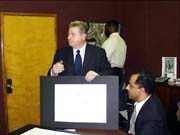Police will have an easier time fighting drugs and gangs after a reorganization of the department, officials said Wednesday.
Changes include more flexible patrols and a new Quality Assurance Program within the police department.
Mayor Glenn Cunningham said that often, the city’s Narcotics Unit gets tied up on specific long-term projects and doesn’t have time to be quickly dispatched to other areas when a commander for one of the city’s four police districts needs it.
The restructuring will change that, and will also increase walking patrols during troublesome hours to cut down on gang activity.
District control
There are four police districts in Jersey City, and each one has a district commander. Before the reorganization went into effect on Monday, the citywide Narcotics Unit was under the control of one unit commander. District commanders would have to go through the Narcotics Unit Commander in order to address any drug problems. Often, the narcotics commander would have the unit concentrated in one area for two to three weeks, so the officers were not available for district-specific problems.
Now, district commanders can make decisions, since the Narcotics Unit will be broken into four districts, as well as one citywide unit.
"Suppose there is a problem at Franklin and Palisades, where the community is complaining about drug activity," said Chief Ron Buonocore. "The captain can send in a marked patrol unit to give special attention to whatever the area is, or they can make an arrest if they see any action happening. But normally, if you see a marked car coming, you’re not going to sell drugs, so the effectiveness of having a radio car is diminished." The Narcotics Unit can be more effective by studying drug activity in an area and using a greater amount of plainclothes officers in unmarked vehicles, Buonocore said.
"Sometimes when the district captain gives [a request] to the narcotics commander, the units might be involved in another part of the city," said Buonocore. "When the citizen makes a complaint, the district may not get a Narcotics Unit for a week or two, depending on what is happening elsewhere."
In order to facilitate a more immediate response, the Narcotics Squad has been divided.
"With the Narcotics Unit divided into five groups, the captain can decide how to use the Narcotics Officers," said Cunningham. "People don’t realize how smart drug dealers are, so we have to outthink them."
The Detectives Unit, which investigates crimes after they occur, has been similarly restructured.
Preventive Operation Patrol
The second element to the restructuring is called the Preventive Operation Patrol (POP). Thirty-seven new officers, who will graduate from the academy on Tuesday, will be assigned to the new tactical squad, which consists of a walking, uniformed patrol force focusing on gang problems and areas with drug activity.
"These individual officers will get command from inside the department," said Buonocore. "We track crime, and if we see an overabundance of calls coming in, we will saturate that area with officers. It is a preventative patrol."
The POP officers will have two shifts, 2 to 10 p.m., scheduled to coincide with the end of the school day, and 6 p.m. to 2 a.m. for when the bars let out.
"We’re going to be POP-ing these gangsters all over Jersey City," Cunningham said.
Quality and effectiveness monitored
A third component is a new Quality Control Unit, created to monitor the effectiveness of police officers from within the department.
"Sometimes it’s hard for people to come forward and make a complaint against an officer, because they’re talking to another officer," said Buonocore, "By monitoring calls internally, we can avoid that."
The Quality Control Unit will monitor phone calls, and review arrest reports and complaints, calling up victims to interview them.
"Monitoring is important so the community can feel that they can feel trust with the police department," said Buonocore. "The police officers will know they’re being watched internally.
Hiring more cops</b>
Cunningham also stressed the importance of keeping the force fully staffed and replacing officers as they retire.
"I don’t want to let the police department shrink as we lose people," said Cunningham. "I want to replace them. Officers now pair up due to the seriousness of crime. We have less officers than in the ’70s, and the crime is worse. People have machine guns now. All the things I’m asking the chief to do would be unfair if I didn’t keep the force up."
In addition to the 37 new officers, 11 have been hired from other police departments.
Buonocore also created new Anti Auto Theft and Anti Robbery Units. The force’s rank and file structure will remain the same.
